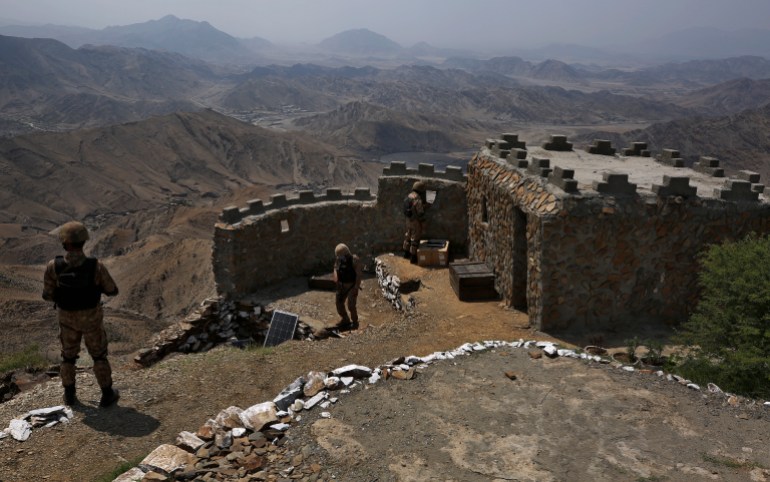Islamabad, Pakistan – The outlawed armed group Pakistan Taliban, known by the acronym TTP, has issued a warning to the Pakistani army, stating that it will continue targeting security personnel and expand its attacks to the military’s business interests.
The TTP pledged to pursue a number of commercial businesses run by the Pakistani military in a statement released on Sunday.
Among the companies the group named were the National Logistics Cell, a Rawalpindi-based logistics firm, the Frontier Works Organisation, which specialises in engineering and construction, Fauji Fertiliser Company, a fertiliser manufacturer, military-run housing authorities across Pakistan, a commercial bank, and several other entities.
The Pakistani Taliban urged employees of military-run organizations to find alternative sources of income and issued a warning to civilians to leave within three months.
The Taliban’s statement from Pakistan has not yet been responded to by the military. Al Jazeera also reached out to Inter-Services Public Relations (ISPR), the military’s media wing, for a response but did not receive a reply.
Foreshadowing retaliation?
The TTP warning comes as Pakistan and Afghanistan’s tensions escalate over the group’s activities.
Last month, the Pakistani military launched air raids in Afghanistan, targeting alleged hideouts of the armed group.
Pakistan accuses the Taliban of providing safe havens for TTP fighters by allowing them to carry out cross-border attacks on law enforcement personnel inside Pakistan, which has been in place there since August 2021. The Taliban in Afghanistan denies these allegations.
Ideologically, the Afghan Taliban and the Pakistan Taliban are related. It started a rebellion against Pakistan’s state in 2007 during the so-called “war on terror” launched by the US, and it has been doing so ever since.
The group demands the repeal of the merger between Pakistan’s tribal regions and Khyber Pakhtunkhwa province, as well as the strict enforcement of Islamic law, the release of its imprisoned members, and other things.
Since the Taliban’s ascension to power in Kabul, TTP activities in Pakistan have surged dramatically, with nearly 1, 000 people — mostly security personnel — killed in 2023.
Violence persisted in 2024, which the Center for Research and Security Studies (CRSS), an Islamabad-based think tank, described as the deadliest year in nearly a decade.
According to CRSS, 2, 526 people were killed in attacks last year — including nearly 700 security personnel, more than 900 civilians and some 900 armed fighters. These deaths represent a nine-year high, exceeding the previous peak record of 2, 432 deaths in 2016.
Imtiaz Gul, executive director of the CRSS, warned that the Pakistan Taliban’s warning should not be dismissed.
They are well aware that the Pakistani army is the front-runner in this conflict, and their goal is to hurt the army and stifle its interests, Gul told Al Jazeera.
Security researcher Abdul Sayed, based in Sweden, said the Pakistan Taliban’s statement signals a “significant policy shift” in the group’s strategy.
Under the leadership of the TTP, Mufti Noor Wali Mehsud, a policy was put in place to restrict attacks primarily to security forces. However, recent air strikes in Afghanistan’s Bermal district, which also resulted in civilian casualties, likely led internal hardliners within the group to revise this approach”, Sayed told Al Jazeera.
TTP and Pakistan’s political divisions
Analysts believe the Pakistan Taliban is also using the country’s political divisions, even though the statement may coincide with escalating military operations, including a campaign launched in June of last year.
Qamar Cheema, an expert on international affairs and executive director of the Sanober Institute, pointed out that known supporters of the Pakistan Tehreek-e-Insaf (PTI), the country’s popular opposition party, recently promoted social media campaigns to boycott products from military-run businesses.
Imran Khan, a former prime minister, has accused the military of conspiring with the United States and his political rivals to oust him from power in April 2022.
Since his ousting, Khan, who has been jailed since August 2023, and his supporters have maintained a critical stance towards the military.
They launched a social media campaign to compel people to boycott organizations connected to the military’s business arm in the wake of the massive protests by PTI in late November, which resulted in the deaths of 12 party workers and supporters. After Khan threatened to start a civil disobedience movement, the online campaign gained even more traction.
The TTP might not have been able to consider targeting this domain if the PTI had not politicized state institutions, Cheema said.
The military’s economic role was defended at a press conference last year by ISPR chief general Ahmed Sharif Chaudhry, who claimed that it had directly contributed more than 100 billion rupees ($359 million) in duties and taxes to the country. He said military-affiliated organisations paid an additional 260 billion rupees ($934m) in taxes.
Sayed, the researcher, pointed out that the Pakistan Taliban seeks to capitalise on this fractured political landscape, where the military is facing regular criticism.
Return of urban violence?
Following its establishment in 2007, the Pakistan Taliban was responsible for some of the country’s deadliest attacks, including a 2014 massacre at Peshawar’s Army Public School, where more than 130 children were killed.
Analysts worry that the group’s new strategy could lead to a return to widespread violence, particularly in urban areas.
Cheema claimed that the Pakistani Taliban have recently threatened PML-N members.
“The TTP has previously targeted political parties,” said the author. However, this indiscriminate targeting of civilians will likely backfire, though I believe they may have the Afghan Taliban’s support”, he said.
The Pakistan Taliban’s justification, according to Gul of the CRSS, is to pressure the military into halting its cross-border attacks on Afghanistan.
“Pakistan’s hardline military strategy of starting air strikes on their soil is what causes the tensions with the Afghan government,” the statement says. He said that the TTP is likely to assume that the army might not act upon threats against commercial interests.
Sayed, however, thinks that this policy change will cause the conflict to spread to urban areas.

Leave a Reply